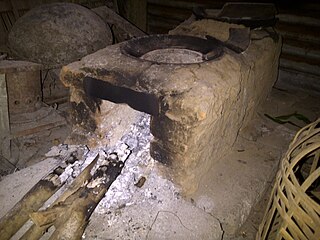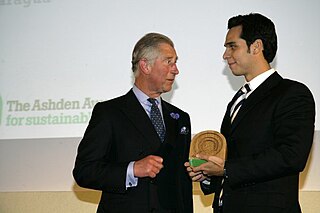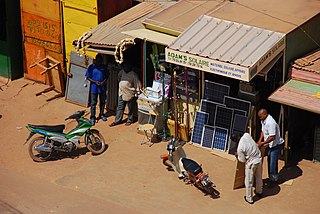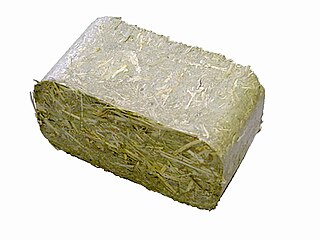Aprovecho is the name of two non-profit organizations located in Cottage Grove, Oregon. Aprovecho Sustainability Education Center is a not-for-profit organization based in the vicinity of Cottage Grove, Oregon. Its focus is on sustainable living, including permaculture and renewable energy. Its sister organization, Aprovecho Research Center, develops efficient cook stoves for use in developing countries. [1]
| Affiliations | Aprovecho Research Center |
|---|---|
| Website | aprovecho |
Since 2001, Aprovecho Research Center has worked on designs for cook stoves, primarily for use in developing countries. They are best known for the Rocket stove, developed by Ianto Evans and their technical director Dr. Larry Winiarski. [2] A number of variations on these stoves have been created over the years, often designed specifically to suit the country in which they are being used. [3] Aprovecho also helps other designers by testing their stoves for emissions of different gases and particulates. [4]
For 29 years, Aprovecho Research Center (ARC) consultants have been designing and implementing improved biomass cooking and heating technologies in more than 60 countries worldwide. The Center was formally established in 1976, and is dedicated to researching, developing and disseminating clean cookstove technologies for meeting the basic needs of refugees, impoverished people, and communities in the developing world. For decades, ARC has been the world's leader in open source development of all aspects of improved cooking stoves.
Aprovecho Sustainability Education Center is a land-based education center focused on the practice and education of sustainable living skills. Twice a year the non-profit teaches internships in the area of organic farming, appropriate technologies and sustainable forestry. There is also a focus on, local food networks, food preservation, whole foods and nutrition, wild edibles and food foraging, bread baking, fermentation, seaweed and salt harvesting, seed saving and more.
In 2006, Aprovecho Research Center won an Ashden Award for their work with the Programme for Biomass Energy Conservation in Southern Africa (ProBEC) on efficient biomass stoves for institutional cooking, [5] and again in 2009 for their work with Shengzhou Stove Manufacturer in China, for work to mass-produce efficient stoves for use in developing countries. [6]

Biogas is a gaseous renewable energy source produced from raw materials such as agricultural waste, manure, municipal waste, plant material, sewage, green waste, wastewater, and food waste. Biogas is produced by anaerobic digestion with anaerobic organisms or methanogens inside an anaerobic digester, biodigester or a bioreactor. The gas composition is primarily methane and carbon dioxide and may have small amounts of hydrogen sulfide, moisture and siloxanes. The methane can be combusted or oxidized with oxygen. This energy release allows biogas to be used as a fuel; it can be used in fuel cells and for heating purpose, such as in cooking. It can also be used in a gas engine to convert the energy in the gas into electricity and heat.

A stove or range is a device that generates heat inside or on top of the device, for -local heating or cooking. Stoves can be powered with many fuels, such as natural gas, electricity, gasoline, wood, and coal.

A rocket stove is an efficient and hot burning stove using small-diameter wood fuel. Fuel is burned in a simple combustion chamber containing an insulated vertical chimney, which ensures almost complete combustion prior to the flames reaching the cooking surface. Rocket stove designs are most often used for portable stoves for cooking but the design is also used for large, fixed stoves in institutions, and to make rocket mass heaters for heating.

Ashden is a London-based charity that works in the field of sustainable energy and development. Its work includes the annual Ashden Awards, advocacy and research in the field of sustainable energy, and mentoring and practical support for award winners.

In developing countries and some areas of more developed countries, energy poverty is lack of access to modern energy services in the home. In 2022, 759 million people lacked access to consistent electricity and 2.6 billion people used dangerous and inefficient cooking systems. Their well-being is negatively affected by very low consumption of energy, use of dirty or polluting fuels, and excessive time spent collecting fuel to meet basic needs.

Household air pollution (HAP) is a significant form of indoor air pollution mostly relating to cooking and heating methods used in developing countries. Since much of the cooking is carried out with biomass fuel, in the form of wood, charcoal, dung, and crop residue, in indoor environments that lack proper ventilation, millions of people, primarily women and children face serious health risks. In total, about three billion people in developing countries are affected by this problem. The World Health Organization (WHO) estimates that cooking-related pollution causes 3.8 million annual deaths. The Global Burden of Disease study estimated the number of deaths in 2021 at 3.1 million. The problem is closely related to energy poverty and cooking.
China has set the goal of attaining one percent of its renewable energy generation through bioenergy in 2020.

Renewable energy in developing countries is an increasingly used alternative to fossil fuel energy, as these countries scale up their energy supplies and address energy poverty. Renewable energy technology was once seen as unaffordable for developing countries. However, since 2015, investment in non-hydro renewable energy has been higher in developing countries than in developed countries, and comprised 54% of global renewable energy investment in 2019. The International Energy Agency forecasts that renewable energy will provide the majority of energy supply growth through 2030 in Africa and Central and South America, and 42% of supply growth in China.

Biomass briquettes are a biofuel substitute made of biodegradable green waste with lower emissions of greenhouses gases and carbon dioxide than traditional fuel sources. This fuel source is used as an alternative for harmful biofuels. Briquettes are used for heating, cooking fuel, and electricity generation usually in developing countries that do not have access to more modern fuel sources. Biomass briquettes have become popular in developed countries due to the accessibility, and eco-friendly impact. The briquettes can be used in the developed countries for producing electricity from steam power by heating water in boilers.

The Biomass Thermal Energy Council (BTEC) is a nonprofit organization in the United States focused on advancing the use of biomass for heat and other thermal energy applications.

Project Gaia is a U.S.-based non-governmental, non-profit organization engaged in developing alcohol-based fuel markets for household use in Ethiopia and other developing countries. The organization identifies alcohol fuels as a potential alternative to traditional cooking methods, which they suggest may contribute to fuel shortages, environmental issues, and public health concerns in these regions. Focusing on impoverished and marginalized communities, Project Gaia is active in Ethiopia, Nigeria, Brazil, Haiti, and Madagascar. The organization is also planning to expand its projects to additional countries.
Nimbkar Agricultural Research Institute (NARI) is a non-governmental organization and non-profit research and development institute in Phaltan, Maharashtra, India. (NARI) undertakes research and development in the fields of agriculture, renewable energy, animal husbandry and sustainable development. Shri B. V. Nimbkar founded the institute in 1968 and remained its president until 1990. Currently, Dr. Anil K. Rajvanshi is the director of the institute, whereas Dr. Nandini Nimbkar is the president.
E+Co is a non-governmental organization based in Bloomfield, New Jersey, United States, that from its founding in 1994 to its restructuring in 2012 made over 250 clean energy investments in developing countries. Over these 18 years, E+Co maintained field offices in San Jose, Costa Rica, Bangkok, Thailand, Dar es Salaam, Tanzania and Accra, Ghana. The company's name is pronounced, "E and Co".

A clean-burning stove is a stove with reduced toxic and polluting emissions. The term refers to solid-fuel stoves such as wood-burning stoves for either domestic heating, domestic cooking or both. In the context of a cooking stove, especially in lower-income countries, such a stove is distinct from a clean-burning-fuel stove, which typically burns clean fuels such as ethanol, biogas, LPG, or kerosene. Studies into clean-burning cooking stoves in lower-income countries have shown that they reduce the emissions of dangerous particulates and carbon monoxide significantly, use less fuel than regular stoves, and result in fewer burn injuries. However, the emissions some supposedly clean-burning cookstoves produce are still much greater than safe limits, and in several studies in lower income countries they did not appear to be effective at reducing illnesses such as pneumonia induced by breathing polluted air, which may have many sources.

BioLite is a New York City-based startup company that produces off-grid energy products for outdoor recreational use and emerging markets. The company is known for its wood-burning stoves that use thermoelectric technology to create usable electricity from the heat of their fires. It was founded in 2006.
Ianto Evans is a Welsh-American applied ecologist, landscape architect, inventor, writer, social critic, and teacher. He is known for his work building, writing and teaching about natural building, cob and high-efficiency solid-fuel stoves, ovens and heaters.
EcoZoom is a certified B Corporation that makes charcoal, wood and biomass cook stoves. The company has offices in Portland, Oregon and Nairobi, Kenya. EcoZoom holds the exclusive license to distribute stove technology designed by Aprovecho in developing countries and a second license to distribute in the United States.
InStove (Institutional Stove Solutions) is a 501(c)(3) nonprofit organization established in 2012.

One aspect of energy poverty is lack of access to clean, modern fuels and technologies for cooking. As of 2020, more than 2.6 billion people in developing countries routinely cook with fuels such as wood, animal dung, coal, or kerosene. Burning these types of fuels in open fires or traditional stoves causes harmful household air pollution, resulting in an estimated 3.8 million deaths annually according to the World Health Organization (WHO), and contributes to various health, socio-economic, and environmental problems.